The police have killed over 1000 people in the US in 2020. Approximately 1 in 1000 Americans has died of COVID-19. The 2020 election is somehow still happening despite voting being months ago. I'm almost 40 (yikes) and this has been, without a doubt, the most harrowing year of my life thus far.
But I'm also caught in this weird place where it's hard to complain. I may be considered "at-risk," with a slew of chronic respiratory issues and a history of multiple collapsed lungs, but my spouse has a career that allowed her to transition to work-from-home early in the pandemic. My kids' school district quickly adopted a remote learning curriculum and they took to it with relative ease. No one in my family or close friend groups has contracted the disease or experienced any significant financial hardship because of it. If I'm suffering it's only out of compassion for the world around me, and the occasional spike of existential dread when shopping around people too obstinate to pull their masks up over their nose.
So as I look back on this year with its common refrain of, "everything sucks, but at least I'll have time to catch up on some video games," I can't help but chuckle at the fact that this was one of the most difficult years for me to keep up with the games that interested me.
Full-time parenting and homemaking can be very busy, but when you have kids going to school and a spouse with a regular commute, there's a lot of flexibility in how your time is budgeted. You can set aside the window from 9 to noon to really dig into the narrative indie game that lacks good checkpointing. It becomes a harder ask when, at any given moment, you might need to step away to lend your spouse or kids a hand. It's why I was so quick to bounce off games like Kentucky Route Zero, Paradise Killer, Umurangi Generation, and Tell Me Why, games that any other year would have been likely contenders for a spot on my top 10. It's why I ended up sticking with Ghost of Tsushima, a game that had very little to say but did contain a very long list of tasks that each only took a handful of minutes to complete.
Maybe next year, when the vaccine has been distributed and our family life is able to get back to where it was in 2019, I'll revisit the things that passed me by this year. For now, let me tell you about my 2020 in games.
Best Old Game
Teppen
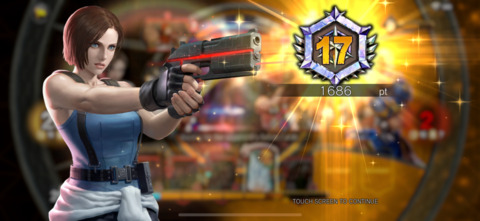
Last year I wrote about about how fun it was to be a part of the discussion surrounding a competitive game from its inception, and this has held true for 2020. Every day I'm checking in periodically with the Teppen community Discord server to discuss balance, decklists, and the metagame; to offer advice to new players; to gripe about bad strings of luck or share my unlikely victories. Between Teppen and GiantBomb FGC server, I actually managed to burn parts of the Discord app into my phone screen. I also manage to play the game every now and then too, usually a handful of matches every day. Now that the kids are stuck at home, I've been taking them with me to walk the dog, making sure they get enough sunshine and exercise, leading to longer walks which are perfect for playing more Teppen.
Unfortunately, the year hasn't been very kind to the game itself. Between pandemic-related development delays and a continuous string of more and more baffling balance decisions, the game has been shedding players since January. Even the dedicated folks who have stuck around spend half their time decrying the state of the game and dreading the next heavy-handed balance update. For me, a player who has been going their own way playing odd decks that look unlike anything that is considered "good," it's been more fascinating than frustrating observing the cluster that competitive Teppen has become.
I'm still hopeful that in 2021 GungHo will be able to turn the game around. But even if this is the beginning of Teppen's death knell, I'm happy to have been along for the ride.
Runners-up:War of the Visions: Final Fantasy Brave Exvius, Spring Falls
Best Surprise
Hades
I'm not the biggest fan of Roguelike games, games that are built around the idea of starting over every time you die. This has a lot to do with the fact that, in the modern era, most Roguelikes are actions games built around the same gameplay expectations. The goal is to play reactively. Play with precision. Get a little bit farther with every run not because of some level-up mechanic, but because you are gradually honing your hand-eye coordination and manual dexterity. This poses a bit of an obstacle for me, as lightning reflexes and precise timings are beyond my capabilities. I have years of practicing piano and guitar and decades spent trying to get good at fighting games to attest to that.
So when Hades hit full release this year and literally everyone was talking about it, I had to keep reminding myself that playing the latest Roguelike in the zeigeist has never worked out in the past. I always would put in a handful of hours then bounce off. Not only that, but it was developed by Supergiant Games, a studio I had nothing but respect for but whose past output had always been a miss for me. For as inventive and enchanting as their worlds were, the actual gameplay never felt right in my hands.
I bought it anyways; fear of missing out is real; and I'm glad I did.
Beyond the story and the progression system and the characters and the worldbuilding, at its core Hades does something other action Roguelikes don't do. It opens up the gameplay to allow for a wider variety of approaches and skillsets. You can still play it with precise reactions, and there are modifiers you can toggle to give you bonuses for playing that way, but you also can play Hades proactively, more akin to an action roleplaying game like Diablo. I may not be able to press buttons suddenly within a very tight timing window, but I can press a lot of buttons very quickly and in Hades you can do that and still find success.
Melted his HP #HadesGame#NintendoSwitchpic.twitter.com/5VvQGgqodO
— The Starving Gamer (@StarvingGamer) October 3, 2020
Runners-up:Final Fantasy VII Remake, Troubleshooter: Abandoned Children
Biggest Disappointment
Umurangi Generation
There's a somewhat frustrating trend where the need to be a game with gameplay comes in direct conflict with a game's desire to reach an audience and express its unique perspective and ideas. The big one that comes to mind is Undertale. People have gushed endlessly about how powerful its themes are, and how effectively it deconstructs video games in general and role playing games in specific. Unfortunately, these are things I have never been able to experience on my own because of the towering barrier to entry called reactive, precision-based gameplay.
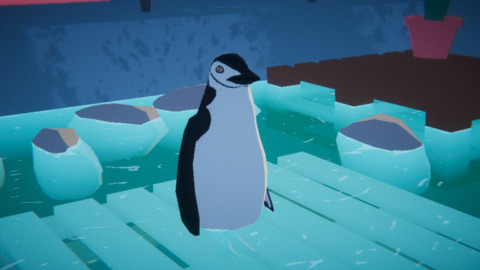
It was a hard-learned lesson. I spent about 20 hours with the game, struggling through encounter after encounter, loading over and over again to try and clear the most basic fights. In the end I hit a major roadblock against one of the bosses, repeating the fight for about four hours over a few days before giving it up entirely.
People tend to get their hackles up when you talk about difficulty options, especially when it comes to a game they love like say, the Souls series. I certainly don't disagree with the assertion that a game's difficulty is a sort of authorial intent, a form of developer expression as valid as a game's writing or graphical design. But two years ago the developers of Celeste understood that while there may have been a way they intended for their game to be played, it wasn't necessarily a way all players would want to or even be capable of playing it. So they included a wide swath of options to help ease the difficulty to whatever felt right to the player. I can't help but wonder what my own experience with Undertale would have been if I had the option to maybe tweak the numbers so I'd be allotted more mistakes per fight, or slowed down the action so I had a few more fractions of a second to get my hands in gear.
Umurangi is the latest game that I've ended up butting up against in this way. It hasn't had the same cultural impact that Undertale did in its time, but the circles of games criticism that I follow have been raving about it all year. In theory, Umurangi is a photography game where you learn the truth of its world through the lens of a camera. In practice, Umurangi is a speedrun platformer with extremely rough platforming controls.
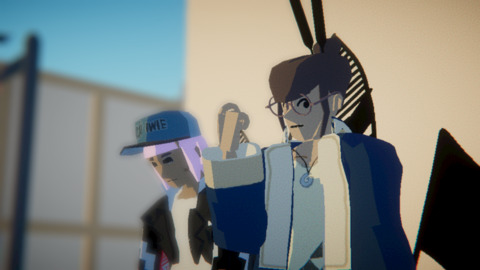
For a photography game, the camera the game starts you with is extremely rudimentary. One lens. Slight zoom capabilities. A few ways to adjust levels once the photo has been taken. The way you gain additional features for your camera is by completing tasks in each area: one for the main task of collecting a specific set of photos, and another for completing all bonus objectives. One of those bonus objectives is to complete your goals within a narrow time limit.
The platforming in Umurangi is rough. Even the game's most ardent defenders admit that the jumping feels bad. Of course, some of the photos you need necessitate you jumping and climbing your way up a number of extremely small platforms. I spent about an hour and a half in that first area, trying to complete the goals within the time limit in order to unlock the stage's second camera feature. I couldn't do it.
Some people suggested that I just keep playing the game and ignore the timer goals, but doing so would effectively halve the number of camera features I would have available to me. In the photography game. I decided to return the game instead, because in my mind I could not reconcile the fundamental disconnect between a game where I wanted to take my time drinking in the atmosphere and carefully lining up beautiful photographs with a game that wanted me to speed through locations taking photos willy-nilly if I wanted to meet the arbitrary goals the developers had set.
Runners-up:Cyberpunk 2077, DOOM Eternal
Best New Character
Judy Alvarez (Cyberpunk 2077)
The writing has been on the wall more or less since the initial reveal teaser back in 2013. CD Projekt Red's Cyberpunk 2077 (to be released "when it's ready") was going to be a de-imagining of the genre, cyberpunk as aesthetic pastiche, a vapid nostalgic regurgitation of watching Bladerunner on VHS as a child, completely ignorant of the political ideologies that have run through it from the onset and have continued to sharpen as new creators have worked in the space since the word was coined in 1980.
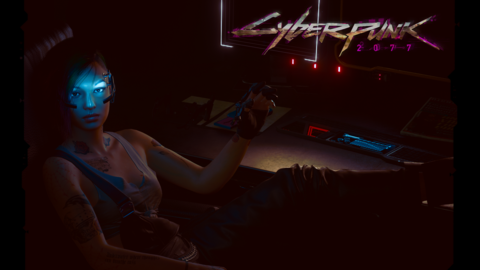
And that's more or less what we got. The game world may be slathered in neon and chrome, but at its core 2077 is telling something much more akin to a high fantasy narrative where the chosen one unites with the spirit of a revolutionary hero from a past age and together they slay the evil dragon. The one shining exception to all this is Judy Alvarez.
Judy belongs to the Moxes, one of the few in-game factions that don't originate from Cyberpunk 2020, the tabletop role playing game which 2077 is based off of. The Moxes themselves are an unstructured collective of sex workers who won their independence from the pimps and gangs through a campaign of bloody riots throughout Night City. Judy herself works as a sort of pornographer editing Braindances or BDs. BDs are experiential recordings made with special cybernetic implants that capture a performer's thoughts, sensations, and emotions. By exclusively catering in BDs, the Moxes are able to create a much safer sex work environment. The performers can record their BDs in a controlled setting with other professionals, and the clients can experience the performers fully through the BDs without having to actually physically interact with one another.
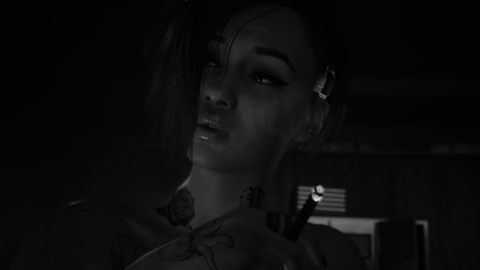
Judy's close friend and confidant Evelyn Parker approaches sex work from a different angle. Evelyn works for the club Clouds as one of their Dolls. At Clouds, clients surrender the entirety of their biometric data to the Clouds algorithm which then fabricates an ideal encounter for them. Clouds selects the Doll it believes is best suited for the client and, for the duration of their time together, the Clouds AI takes full control of the Doll's body via a control chip to ensure the perfect performance. Whether this is simply some cuddling and pillow talk or intercourse, the Dolls themselves are never aware of what transpires during the session. This creates a level of security for the clients if they're willing to trust the AI to safeguard their privacy. However, it does leave the performers vulnerable, as the algorithm cannot detect whether a client may suddenly turn violent, nor is it equipped to protect the Dolls in such a situation. For that, Clouds relies on the club's security, but at best they can only prevent further harm after a client has already started acting out.
Things eventually break bad for Evelyn, ever the fate of those who are written into the role of the dame in a crime drama. And while you and Judy eventually manage to rescue her, the trauma she suffered in the interim eventually leads to her taking her own life. Driven to ensure that Evelyn's death was not in vain, Judy decides to do for the Dolls what the Moxes did for other sex workers long ago: overthrow the current power structure and put control of Clouds in the Dolls' hands. She puts together a crack team, you included, and you eliminate the middle manager whose negligence led to Evelyn's death before making a show of power to the gang bosses in charge of Clouds. You think you can own us? Well we can get to you too buddy so back off because Clouds is under new ownership now.
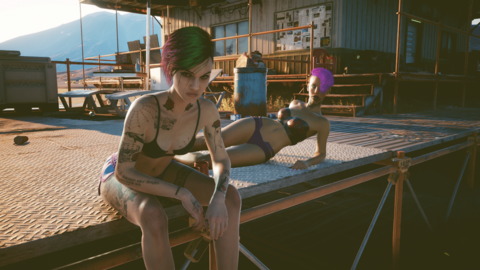
It lasts for about a day.
In the final leg of Judy's story she invites you to go diving in a lake just outside the city to explore the sunken ruins of her childhood town. After the dive, she reveals to you that things at Clouds have gone to shit. It turns out the efforts of a few plucky upstarts was nowhere near enough to intimidate one of the largest gangs in the city. They simply came back with more people. The Dolls you and Judy worked with are all either dead or severely injured, and Clouds has been shut down.
The world building that surrounds Judy and Evelyn is one of the few places where the game really examines the very cyberpunk ideas of transhumanism and the commodification of bodies under late stage capitalism. And through their shared narrative, they roll out one of the genre's core themes: individual action, no matter how heroic, is completely ineffectual in the face of systemic inequality and oppression. It took the collective action of an army of sex workers, racking up a huge body count and massive property damage, for the Moxes to carve out the most meagre of spaces free from government or gang interference. Judy tried to pull it off with five people.
Eventually Judy tells you why she invited you to go diving with her. After Evelyn and with the ways things went down with Clouds, she's ready to leave the city. If you're playing a female character you can choose to start a romantic relationship with her and convince her to stay, and she does for a time. But in the end, no matter what you do, she goes. When she first came to Night City, she thought she could make a difference, use her talents to help make life better for people. In the end she learned that in this world you either get out, or you get got. And that's cyberpunk, baby.
Runners-up:Jesse (The Last of Us Part II), Jessie Rasberry (Final Fantasy VII Remake)
Best Moment or Sequence
Playing Guitar/Take on Me (The Last of Us Part II)
I don't know a lot about the lifespan of guitars but it's very amusing to me that Ellie keeps finding them in various abandoned ruins, somehow still in perfect working condition.
I remember the first time they showed me the guitar interface in the game. It was surprising, but seemed more like a basic minigame than a tool. Select the correct cord with the analog stick. Swipe the touchpad to strum. Play a handful of chords and the game takes over, continuing with the cutscene. It wasn't until the second time a guitar cropped up and let me enter a free practice mode that I realized just what they had done.
Somehow Naughty Dog had turned the DualShock 4 into a whole-ass guitar. On the analogue was the same chord wheel, but I could flip through different wheels, each with a different set of chords to choose from. Strumming the guitar wasn't a simple all or nothing action. They had actually set different zones of the touch pad to reflect each of the six strings. You could choose to strum only a few strings, or even tap a specific string to play a single note. I ended up spending an unreasonable amount of time trying to play songs using their guitar interface and never got particularly good at it, but several people out there did.
It's always interesting, the ways developers try to translate music playing to a relatively simple tool like a controller. The Last of Us Part II's guitar is one of the most clever and flexible versions of this I've ever seen. And it doesn't hurt that the song Ellie plays for Dina in that moment is one of the most previously gay moments in any piece of media ever.
I had to lol #TLOU2#PS4sharehttps://t.co/MzsyH9ii7opic.twitter.com/ZGi10br9cQ
— The Starving Gamer (@StarvingGamer) January 1, 2021
Runners-up: Completing My Orchard (Animal Crossing: New Horizons), Kingdom Hearts x Final Fantasy Versus XIII (Kingdom Hearts 3 Re:Mind)
StarvingGamer's Top 10 Games of 2020
10. Hyrule Warriors: Age of Calamity
The Warriors franchise is defined by its bloated rosters, and the impact that bloat has on its game design. I took a break from the franchise from 2001 to 2017, and while they added a ton of frankly welcome busywork managing items and skill trees between missions, the core problem remained. With its relatively simplistic control scheme butting up against the wide selection of available characters, there wasn't enough to differentiate between playing any of the dozen of sword wielders or half dozen sword wielders but on horses. My time with Fire Emblem Warriors was largely spent playing it at night as a mindless action to help ease me to sleep.
I ended up picking up Hyrule Warriors: Age of Calamity primarily for my kids as a game they could play together. They had a little bit of fun with Fire Emblem Warriors and I figured the colorful characters and world might be more engaging for them. Instead, they've been on a major Minecraft binge. I've been the one playing Age of Calamity, and it's a huge step up for the franchise.
Because of the leaner roster, the developers at Koei Tecmo have been able to pay a lot more attention to each character. By giving every character a wholly unique set of attack animations with unique properties and special character-specific mechanics layered on top, it is easy to keep the gameplay feeling fresh by swapping from character to character to character, across missions and even mid-mission as well. The magical world of Legend of Zelda also grants the game a much broader palette to work with in terms of character types. Warriors games almost entirely focus on soldiers with spears, axes, swords, bows, and that's mostly it. In Age of Calamity you have characters who can rip exploding pillars of rock from the ground, bird people who fly, plant elementals who summon forest sprites to aid them, and a quartet of giant women who live inside a roving flower and attack with exploding kisses.
The busy work also has gotten a major upgrade from Fire Emblem Warriors. The upgrade system for characters and their weapons has been streamlined, with far less grinding for materials required. The upgrades themselves are displayed as points on the map, like these are rewards you're getting for completing specific tasks for people in the world instead of just passionlessly ticking a box because you have enough upgrade crests or whatever. It's a simple change that for some reason makes me much more eager to engage with that part of the game.
I'm still, I believe, three characters shy of unlocking the full roster, and I'm very curious on what unique ideas those last three characters will bring. But even with the 15 I currently have access to, I have more than enough gameplay variety to keep me coming back to this game until I run out of new missions to complete. If they can take this learner design philosophy and carry it over to the rest of the franchise, I might start checking in with the Warriors games more often.
9. Animal Crossing: New Horizons
What is there to say? It's another Animal Crossing game. I know that some people bucked against the increased gaminess of this entry, with all the different materials you had to gather and farming for recipes and whatnot, but having already put a bunch of time into the mobile game, Animal Crossing: Pocket Camp, I was already mentally prepared for Nintendo to make this shift.
The increased sense of ownership I felt over my island, being allowed to choose where everything went and even reshape the terrain however I wanted, really captured my attention. Visiting my spouse's island and vice versa to see what we had been up to, to wish on stars or get a sick recipe from a villager, or just hang out and smack each other with axes as such a joy. And I can't overstate how much checking in every day to hit my rocks, shake my trees, water my flowers, dig my fossils, and do some shopping helped add structure back to the amorphous blocks of time that days became at the onset of shelter in place.
It wasn't until the Summer update that my enthusiasm for the game really started to wane. My museum was completed, I had cheated and stonked my way to tens of millions of bells in the bank, and my island was pretty much where I wanted it to be, having just used the Nookazon trading Discord to secure some blue roses, the last flower type I was missing from my mountaintop garden. With no real goals in mind and the time consuming nature of the new diving system, my check-ins grew shorter and shorter until finally I just stopped playing. I missed out on all the fall and winter holiday events and unless something major changes to get my spouse back into it, I probably won't be revisiting my island any time soon.
None of that takes away from the fact that it was a much needed balm of pleasant positivity in a time when we all really needed it.
#BlackLivesMatter#AnimalCrossing#ACNH#NintendoSwitchpic.twitter.com/lP94sArsCU
— The Starving Gamer (@StarvingGamer) June 1, 2020
8. Star Renegades
Star Renegades is a Roguelike RPG where the fundamental push and pull comes from its timeline mechanic. Each turn the player is granted near-perfect information of what the timeline of enemy actions is going to be. Among the various attributes of your characters' abilities are how quickly in the timeline they can be executed and how much they will delay an enemy's intended action. If you delay their action long enough, they will be forced to wait until the next turn to attack. Delay the enough times, and they will become immune to your delay abilities, making their next action inevitable.
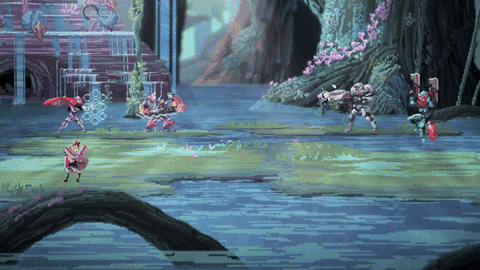
In a lot of ways, Star Renegades makes good on the promise of what I initially thought Into the Breach would be. You won't find success without engaging with the layered, wide array of mechanics and systems. Each decision must be excruciatingly made as a bad choice now might cause you to ultimately fail against another enemy several battles in the future. This decision making extends beyond the battles as well, when you're picking between one of three items to loot from a chest, deciding whether to take on another fight or visit a repair station, or selecting which characters to invest experience points in and which pairings will spend downtimes together to build their bonds and gain access to powerful team abilities.
The 14 playable characters that can make up your party all function extremely differently, which can completely shift the way you have to approach your encounters from playthrough to playthrough. The randomized nature of equipment, and the ways it can drastically alter a character's strengths, means that even with a familiar team you can easily end up fighting in a way you've never fought before.
If I had any complaint to levy against the game, it would be that because of how much you need to scrutinize every move, single runs can easily take 5 or 6 hours to complete. Failing 5 hours into a run, especially because you had bad luck with equipment or the lack of synergy between the characters the game made available to you, feels bad every time. I'd love if this system could be translated to something more akin to a proper RPG because it is so fun to engage with, but for a small studio to make such a well conceived and finely tuned system like this, I'm more than happy to keep diving in run after run.
7. Troubleshooter: Abandoned Children
Troubleshooter is a very odd game.
It initially released in 2017 as an early access game. Most games that start as early access focus on short, repeatable gameplay. When the expectation is that players are going to be starting over all the time anyways, it's fairly straightforward to introduce new characters, systems, enemies, and environments to your game. You just put it in and players can start encountering it on their next playthrough. Troubleshooter, however, was trying to tell an expansive linear story with a wide cast of characters, so the developers at Dandylion came up with a somewhat unique method for rolling new content into their game.
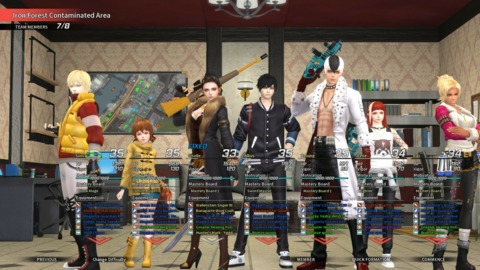
Troubleshooter is a tactical game in the vein of the modern X-COM series, where you deploy a number of soldiers on missions. In Troubleshooter that number is 8, and from the start of the game it makes it very clear that you can deploy up to 8 characters at once. There's one minor snag though. You start the game with only one character. For the duration of the twenty or so missions that make up chapter 1, you only ever get a second character. The game instead fills out your roster with generic police troops and this has continued for the duration of my playthrough. I'm currently over 100 hours played with 4 chapters completed and still have barely reached 7 characters total. What seems to have happened is the developers started with half a chapter, two playable characters, and a handful of enemies, systems, and environments, and with the release of each update have simply been stapling new content into the game.
This is why the only shopkeeper you have access to in chapter 1 lives in your base, only sells weapons, and only in varieties that are usable by the starting classes of your first two characters. This is why despite the fact that crafting "exists" from the moment you start the game, the first recipes you get access to are for level 20 items. This is why instead of introducing new enemy types to you in a gradual stream, they show up in huge gluts.
The game has some confusing politics which are hard to fault the Korean developers for, as this is a story they first started writing in 2017. Still I would be remiss if I didn't acknowledge the fact that the Troubleshooters are basically super mercenary cops that the regular cops rely on because crime is out of control in this world. The faction that you primarily face in the first chapter are the Spoonists, basically anarcho-socialists who are so tired of being the have nots that they are rebelling against society. One of their primary philosophies goes something like, "If 10 people are willing to give a spoon of rice, we can create another bowl." It's worthy of a side-eye, but the game also largely presents the Spoonists as sympathetic if misguided people, largely undone by their leadership's willingness to sell their own people out for their personal agendas.
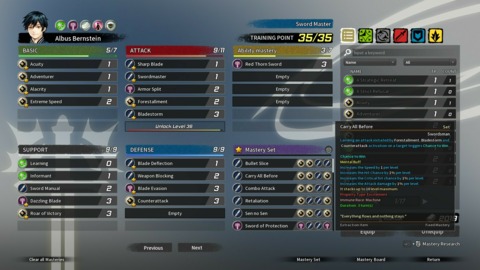
There's also the fully sentient animals of the forest that are trying to stop the human city from encroaching on their land. The messaging is confused again as they're both presented as almost an analogue for native tribal societies but also you sure do kill a lot of them on missions to protect the highways or repair the laser fences that stretch far beyond the city walls.
But the wildest thing is that the Abandoned Children, the people who the game is ostensibly about, don't even properly show up until halfway through chapter 3. It is revealed that the phrase "abandoned children" is in reference to the orphans who live in the poverty stricken areas outside of the major cities. These are people who have been robbed and beaten, forever at the mercy of the crime syndicates and denied any sort of protection by the authorities. So maybe this story isn't actually about this group of plucky teens trying to start their supercop organization, maybe it's actually about this other group of angry teens who are striking back against the system that abandoned them.
I really have no idea where this game is going with its themes, but beyond that and the uneven game structure, the actual tactical combat is incredibly engaging. The game does a lot with debuffs and elemental effects that interact with each other and with the terrain allowing you to pull off huge momentum swings if you can arrange the pieces just right. Each characters has multiple classes to choose from and a wholly unique set of attacks. There's a special mastery system that functions similarly to feats in Dungeons & Dragons, small modifiers that tweak your characters to make them more efficient in different situations.
They're still adding content to the game despite it being in "full release" since April of this year. I plan to continue chipping away at it in 2021 and maybe after another 100 hours I'll finally have an idea of what they're actually trying to say with this story. And hopefully I'll at long last be able to field a full 8/8 characters when I deploy on a mission.
6. Cyberpunk 2077
It's amazing what properly calibrated expectations can do for what would otherwise be an incredibly disappointing experience.
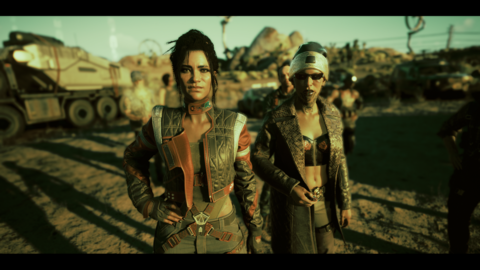
No one, least of all me, believed that a company that would force its employees to work mandatory 6-day work weeks for months and, in the case of some employees, nights and weekends for a year or more, would be able to write a convingly counter-capitalist cyberpunk narrative. No one believed that a company willing to repeatedly dog whistle to its far-right fans on social media, who felt justified plastering art fetishizing trans women across its game world because the game's cis female lead artist thought that trans women "look hot," would be able to speak to any sort of transhumanist ideologies.
It turns out it's actually worse in game. The one bit of explicitly "counter-capitalist content" comes in a series of vague anti-capitalism slogans that you receive in text form from a group calling itself the "Bartmoss Collective". At the end of the quest investigating the collective you discover that the messages all come from a hacked fortune telling machine, reprogrammed by some asshole for the sole purpose of trolling people. Johnny Silverhand, the man who lives in your head, admonishes you for thinking that there was any meaning to be found here. The only trans character, a bartender named Claire, is actually a pretty cool character who unfortunately is saddled with the worst string of sidequests, a series of races in a game with atrocious vehicle controls. If you don't have the patience to slog your way through several of these unnecessarily long races, you never even find out the fact that she's trans.
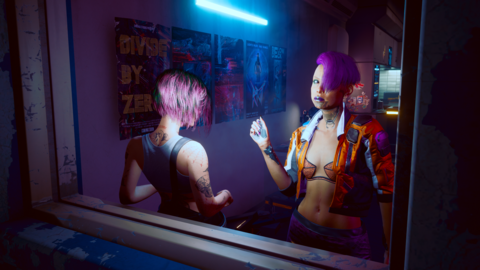
It's a game that touted your ability to slap a dick onto your character regardless of your body type, but decided to lock your gender identity to your voice when tone of voice is one of the areas that trans people struggle with the most when it comes to their identity. It's a game that put both romanceable female characters in critical roles in the main story and relegated both romanceable male characters to side content that the player might never come across. The gay male love interest was written to be the most pernicious of stereotypes, the rich older gay man who refuses to act his age as he chases far younger men. The rich older gay man with a substance abuse problem who has a personal chef that can't cook but is hot and Filipino.
So why is it that after my initial 70 hour playthrough I immediately hopped back in and have already put another dozen or so hours into a second character? The game part of 2077, it turns out, are actually a lot of fun.
There has been nonstop reporting on the buggy mess that the game has been for most players, particularly on the older game systems. Thankfully my PC is recent enough that the game runs fine at relatively high settings, and the caliber of bugs I'm experiencing aren't actually severe enough to bother me. Sometimes something will go horribly wrong and I'll lose 10 or 15 minutes of progress because the game breaks, but mostly it's just wonky animations, stuff randomly exploding, inconsequential items getting stuck in the terrain so they can't be looted, all pretty standard fare for the genre.
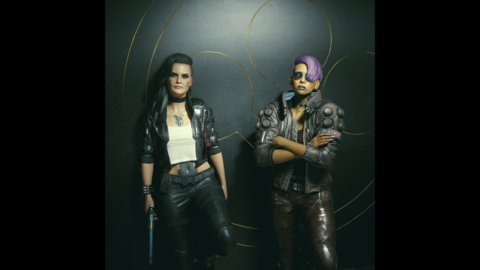
2077 is what I like to call a checklist game. They plop you into the game world and give you a whole bunch of shiny icons across the map that you can take on, one by one, like ticking items off a checklist. The objectives are usually close enough and quick enough to reach and complete that it's extremely easy to get into a rhythm bouncing from one to the next. There's always time for just one more gig, one more assault in progress, one more stop into the gun shop to see if anything new is in stock. And the degree of customization the well-designed skill system gives you provides that extra degree of attachment to your character. It was fun listening to other people talk about their ability to send enemies flying with a single punch or to send a deadly virus cascading through an enemy hideout while I shared stories about my character's ability to build a deadly rifle that could pierce through steel walls out of soda cans.
The game also at times tells a fairly compelling crime story. It's not very cyberpunk, and the themes absolutely still suck. It's a big yikes when your ex-gangster buddy sees a bunch of people get shotgunned down by the mega cops and his response is, "they probably deserved it." Also, having your underground cybernetic surgeon start touting the feature in your new eyes that lets you see what crimes people are "guilty" of so you can collect bounties on them for incapacitating or killing them isn't great. But the core emotional beats largely land, thanks in no small part to the expert voice acting.
What can I say, I like me some problematic media. I'm probably going to stay on the 2077 train until I beat it at least a second time, and then I'm sure to be back for whatever DLC comes further down the line. Recently I've been obsessed with the photo mode and I've really grown enamored with the collection that I've been building. Honestly I could probably play this game forever just for that feature alone. Still, it fucks me up to think that this game is what's going to define cyberpunk to a lot of young people. Everyone who plays 2077 should also play The Sprawl.
5. Wasteland 3
After bouncing off Shadowrun: Dragonfall, Pillars of Eternity, and Divinity: Original Sin, I figured maybe I had just moved on from this style of CRPG. At least two of those games were universally praised by fans of the genre but they did nothing for me, so it's weird that I decided to pick up Wasteland 3.
I suppose it was mostly a timing thing. The game was also getting universal praise, but clearly that was no indication of whether or not I'd find it engaging. Mostly I was looking for something new to sink my teeth into as the last major release I had put time into was Ghost of Tsushima, a game that came out a month-and-a-half prior. I believe there was also some sort of coupon/sale situation going on at the time so I figured why not.
It turns out maybe I'm not actually done with the genre. Maybe I've just lost patience for egregious clunk in my old age. Divinity's obsession with adhering to a tabletop RPG sort of feel leads to a lot of unnecessary busywork. I shouldn't have to manually transfer all my coins from my party members to my best barterer before shopping. It's just nonsense. And I'll never understand the design decision in Shadowrun to make it so you can't take cover and shoot around doorways.
Thankfully playing Wasteland 3 is smooth and effortless. Like a lot of the games on this list, ultimately what made playing Wasteland so fun was interesting decision making in and out of combat, a real sense of ownership over my characters by building them in specific ways, and an inventory system that was enjoyable to interact with and try to optimize.
Wasteland 3 largely wears its politics on its sleeve, you deal with cultist who worship an animatronic statue controlled by an AI Ronald Reagan who summarily executes anyone it suspects of being a communist with its laser eyes, and because of the general tongue-in-cheek tone it's easy to forgive it when it fumbles. The varied twists and turns your story can take also make it a good game for sharing stories with your friends as you compare decisions and outcomes.
When you beat the game they play you a song over the credits with lyrics that change to reflect the choices you made along the way. Funnily enough, one of the few bugs I hit while playing the game came during the song, when near the end it stopped giving me verses and only the instrumental played. If nothing else, it was a good reminder that with this sort of game it's more about the journey than the destination.
4. Hades
As it turns out, Hades was so surprisingly fun to play that I ended up doing a grand total of 170 runs, with 150 clears and a final clear streak of 94.
I've already written a fair bit about the game, so I'd like to use this space to acknowledge the incredible work that Supergiant did developing it. It's a game that screams polish from top to bottom; in terms of narrative design, game flow, battle mechanics, progression systems, graphics, music, voice work, everything in the game is immaculate. And according to the company's employees, they accomplished all of this without a single instance of crunch and with ample paid leave to manage personal health crises.
The game itself is wonderfully inclusive, reimagining the Greek pantheon as people of all different ethnicities. There are loving representations of straight relationships, homosexual relationships, polyamorous relationships, aromantic relationships, and even a canine relationship with Cerberus so long as you only give him pets on one of his heads.
If there's one knock to be made against the game it's that everyone falls into a very narrow, mainstream idea of hotness. No hate against Aphrodite for her nude, shapely figure made modest by strategically placed strands of her flowing hair. But there was a real missed opportunity with Dionysus, the god of wine, making him look like a super shredded bodybuilder instead of like, a hot fat guy.
It's a minor quibble, and nowhere near enough make me think of hesitating to recommend this game to anyone who is remotely interested. I've enjoyed my time with it and feel comfortable saying that I've completely plumbed its depths, but should they release any sort of expansion for the game, I'll be ready to jump right back in.
170 runs later I finally cleared heat 20 with all weapons. Can't wait for an expansion maybe please? #HadesGame#NintendoSwitchpic.twitter.com/LgTbEEUapm
— The Starving Gamer (@StarvingGamer) November 15, 2020
3. 13 Sentinels: Aegis Rim
I've always enjoyed Vanillaware's games because of their peerless 2D visuals and animations. They really are in a league of their own with their painterly character designs and backdrops, even if they have a tendency to get excessively horny with their female characters. But I wasn't sure what to expect with 13 Sentinels; I had purposely gone in blind. All I knew was that it was some sort of visual novel, tactical RPG hybrid, a major departure from the action games they had built their reputation on.
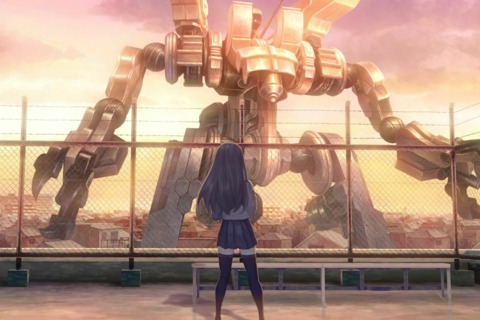
If I had to summarize the general concept of 13 Sentinels, it's essentially a nesting doll of science fiction, anime, and mecha tropes where you view the story out of sequence from 13 different perspectives. As you learn more and dig deeper, what initially presents itself as a time travel story gradually reveals itself to be something else, then something else, then something else, then something else. Once it had its hooks in me I was treating it essentially like a page turner, taking advantage of every spare moment I could to see another scene as I tried to piece together the mysterious truth of the world these characters were inhabiting.
Most remarkable to me is how effective the game is at eking out information to you in a way that constantly keeps you guessing, because there is no set path for viewing the story's scenes. Instead you are given free reign (with occasional gating) to choose the order in which you experience each character's story. Maybe you really want to know what's going on with Juro so you play a bunch of his scenes all at once. Maybe you end up skipping around between all the different characters. Maybe you decide to spend some time running tactical missions where more storytelling unfolds.
The tactical gameplay is also very well designed. It strikes an amazing balance where there's enough going on to make the fights feel dynamic and exciting, but not so much that it ever feels like it's taking time away from the narrative. Clearly they knew they had something special going on, as from what I understand they included a total of 9,999 optional bonus stages you can choose to tackle after beating the game. They also do that fun thing where even details like the way the battles are displayed and the scoring and leveling mechanics are revealed to have been secret worldbuilding all along.
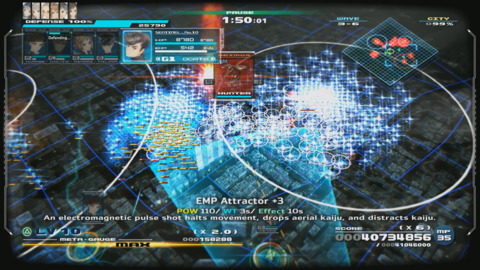
I don't want to go into any more specifics. I'd rather not spoil anyone who hasn't had a chance to play the game yet. I'll just add one minor addendum here for the game's treatment of queer characters.
I honestly can't remember if there was any sort of queer representation in past Vanillaware games, but it's worth noting that the game was published by Atlus, a company with a particularly terrible history in its portrayal of queer identities. Most notable is their overuse of the stereotype of older gay men who prey on younger boys in the Persona series and their depiction of trans women "tricking" straight men into relationships with them in the Catherine games.
13 Sentinels features a romantic subplot that explores ideas of homosexuality, bisexuality, and nonbinary and genderfluid identities. It's very surface level, but done in what comes across as a very earnest and heartfelt way for about 99% of the game. In the epilogue they fuck it up and turn it into a gay panic joke.
So if you do decide to play this game, be ready for that, and if you're a big ol' nerd like me, get ready for a rollercoaster of a story that will reward you for your knowledge of sci-fi, anime, and mecha tropes.
2. Final Fantasy VII Remake
I played the original Final Fantasy VII (FF7) to death when I was in high school. I cleared it multiple times. I spent forever in that one room with the Magic Pots and Movers in order to max out everything, including enough copies of Knights of the Round to equip a full party. I even wrote my own complete walkthrough for the game, an artifact thankfully lost to time. It's also a game that I don't like very much.
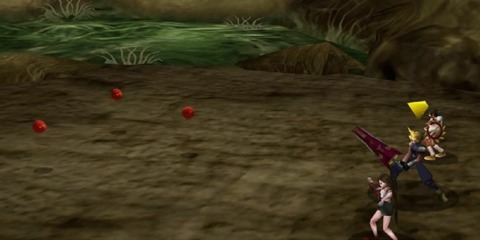
You hear it all the time from us old heads. Back in the day there weren't so many games to play. You got your one game for a birthday or Christmas or maybe a really solid report card and you played it to hell and back because your options were limited. For most of 1997, my game was FF7, and on the first playthrough it was amazing. The story and characters were fresh and exciting and there's no taking away from the revolutionary way the game introduced cinematic spectacle to RPGs and video games in general. But eventually novelty and spectacle wear off and all that you're left with is gameplay, and that was FF7's biggest flaw.
FF7 took the idea of character customization present throughout the series to its logical extreme with the new Materia system. Unlike other games where characters would learn skills and spells by spending time equipping a specific item or leveling up a specific job, in FF7 a character's abilities were determined by the Materia they had equipped. The Materia were free to swap between characters, and it was the Materia themselves that you were invested in making more powerful. This ended up flattening the roster in gameplay as you could always just slot in your strongest Materia set on whichever characters you had and have battles play out largely the same way.
Imagine my surprise when I discovered that Final Fantasy VII Remake (FF7R) has managed to both maintain the feel and function of the Materia system and also create one of the most distinct and varied sets of characters in any Final Fantasy game. The move from turn-based menu-driven combat to action suddenly means that Cloud's sweeping sword swings, Tifa's focused fists, and Barret's long range barrages all serve very different purposes. Beyond the universality of Materia, characters each gain unique skills such as Barret's ability to draw the enemy's attention while bolstering his own defenses and Aerith's ability to etch a sigil onto the ground that will double the spellcasting abilities of anyone standing on it.
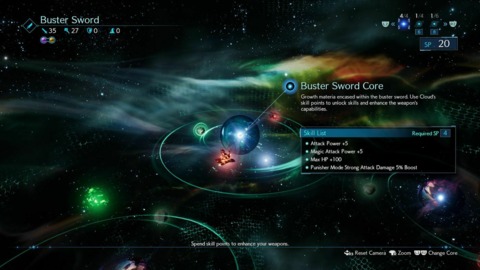
Even more exciting for me was the ability to fully customize your characters through the revamped weapon system. Unlike most RPGs where your weapon choice typically boils down to which one makes the numbers the biggest, almost if not all the weapons you obtain over the course of the game have their own uses. This is because inside each weapon is a sort of skill tree/upgrade grid that lets you tune each weapon to better serve a different role. Each weapon's upgrade grid is unique, and presents the players with a handful of ways to specialize that weapon.
Depending on your party composition and the specific encounter you're facing, any character might need to fulfill the role of attacker, spellcaster, healer, tank, or some sort of hybrid. Between the weapon options and the Materia system, you can easily reconfigure your party into just about anything. Even then, thanks to their unique attacks and abilities and the different ways you can adjust their weapon properties, no two characters will fulfill the same role in the same way.
Honestly, they could have remade FF7 beat for beat and only changed the combat system and I would have been more than happy to play the remake. Instead, they greatly expanded on the original material and turned what previously were bit characters with a handful of lines across the game into instant fan favorites. The absolute wine aunt/2nd grade teacher energy they imbued Aerith with and the way she and Tifa interact with Cloud and each other is incredibly charming and every shipper's dream come true. They gave players a much better feel for the world and made the more implicit environmentalist themes of the original game explicit. And they did absolutely the most when they turned the remake into a meta narrative about the original game.
The first time the plot ghosts showed up to harass Aerith and Cloud I thought, huh, weird. That's new. The second time they showed up, this time seemingly to help Aerith and Cloud, is when I realized what they were doing. They were taking events that seemed like they were starting to unfold differently from the original game and forcing them back on course. Suddenly I was much more engaged in seeing where Square was going with this. It resulted in some emotionally charged moments, primarily around character deaths and undeaths, and left the story in such a puzzling place that I can't wait to see what they have in store for FF7R-2 or whatever it is they end up calling it.
When your girlfriend *and* your boyfriend have equally impressive abs 🙌🏼💯✨ #FF7Rpic.twitter.com/7xaRUeV6o5
— Jen Bartel (@heyjenbartel) May 15, 2020
1. The Last of Us Part II
Ok it super sucks that Naughty Dog is another studio that burned out its developers with mandated crunch. It's fucked up that when abuse allegations were levied against them by a former employee, they immediately swept it under the rug. It's stupid that they chose to call a games criticism publication to chastise them for a less than glowing appraisal of their game. The game's director, Neil Druckmann, should have his Twitter taken away from him and maybe Troy Baker should just stick to reading lines into a microphone instead of airing his trash opinions.
Oh right also it's stupid that they wouldn't let reviewers talk about the second playable character at all. It sucks that developers aren't really willing to start considering the sort of impact having artists carefully animate these horrendous scenes of cruel violence might have on their psyches. What does figuring out how to convincingly make it look like the impact of a baseball bat is slightly caving in a man's skull do to you? I have no idea. And you don't really get to wave your representation flag when you relegate non-white characters to ancillary roles and leverage transphobic abuse as a character growth moment for your cis het protagonist.
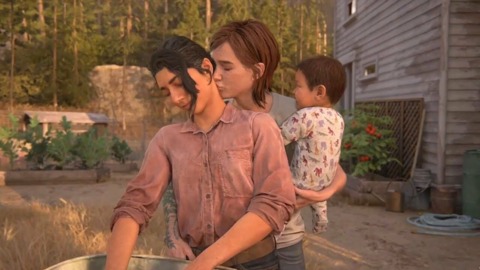
Phew. So this was my favorite game this year?
Maybe favorite isn't the right word for it, lord knows I was absolutely miserable for long stretches of it. I ended up shielding my eyes every time the violence got too intense, which was constantly. The action was fun, though. They really fine tuned what was present in the first game and I already had a ton of fun with that back in 2013 so uh, yeah.
Really what it all comes down to is that, beyond its mechanics, beyond its production values, this game stayed with me in a way that gave me a lot to think about. It had very clear things to say about the ugliness of the cycle of violence, of revenge, of extreme trauma. I've heard criticism that these are all well trod themes in other media, but that's sort of irrelevant to me. It's different experiencing it interactively, with this level of fidelity and craft on display.
It's a shame that game reviewers were told not to write about Abby. Maybe without that restriction they might have spent more time thinking about her journey and the way she mirrors Joel from the first game, both in narrative and mechanics. Maybe by reflecting on the game closing on an image of hope, Abby and Lev's boat having finally reached the shore of Catalina Island where the remnants of the Fireflies are based, they might have had a different takeaway about what themes were really at play here.
I don't know. What I do know is that I like complicated media, and The Last of Us II is just that. The themes may be clear, but the characters' relationships to those themes, and our relationships to those characters, are complicated.
Good girl, Alice 🐕🌿 #TLOU2pic.twitter.com/TufuG6qog4
— Jen Bartel (@heyjenbartel) July 1, 2020




















Log in to comment